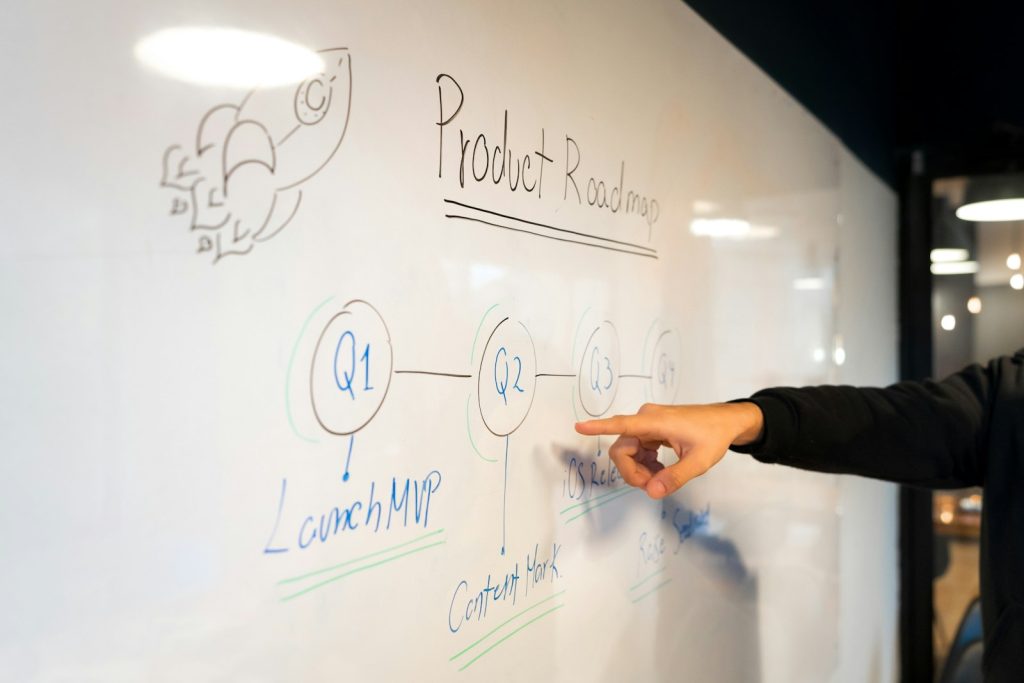Launching a startup in the UK has never been more exciting or more competitive. With venture capital tightening and consumer expectations rising, founders are under pressure to validate ideas quickly, efficiently, and with as little risk as possible. That’s where the Minimum Viable Product (MVP) comes in.
But here’s the catch: not all MVPs are created equal.
Today, the smartest UK founders aren’t just building MVPs, they’re building them the right way. If you’re looking to build an MVP in the UK in 2025, this guide will show you how to do it strategically, avoid common pitfalls, and get to market faster without cutting corners.
Why MVPs Still Matter in 2025

Some argue that the MVP is outdated. The reality? It’s more relevant than ever.
The best founders use MVPs to validate real demand, secure early funding, and gather crucial user feedback before investing heavily in full-scale development. Done right, an MVP helps you:
- Save time and resources
- Reduce risk
- Test key assumptions with real users
- Secure stakeholder and investor confidence
In the UK startup ecosystem, especially in cities like London, Manchester, and Dublin, the bar is high. You can’t afford to spend six months and £100k only to learn your product doesn’t solve the problem you thought it did.
That’s why smart founders are changing how they build MVPs in the UK by partnering with lean, agile, and startup-focused dev teams who move fast without sacrificing quality.
How UK Founders Launch Startups the Smart Way

One thing separates successful UK startups from the rest in 2025: speed to learn.
Founders who thrive are those who launch, learn, iterate, and scale without wasting precious runway. This means skipping bloated dev cycles and focusing on what truly matters: solving one specific, validated problem.
1. Start With Discovery, Not Code
The smartest founders don’t start with wireframes, they start with users. Understanding user pain points, habits, and behaviours comes before any line of code. A proper product discovery process allows you to identify the core problem, define a clear value proposition, and map your MVP scope.
This early clarity saves months down the line and ensures you’re building something people actually want.
At Dev Centre House, the Startup Programme begins with exactly this kind of deep discovery process. It’s not just about getting to MVP. It’s about getting to the right MVP.
2. Define Clear MVP Success Criteria
A Minimum Viable Product is not a prototype or a half-baked version of your final product. It’s a version that solves one real problem for a specific user group, and does so well enough to measure traction.
UK startup founders who succeed in MVP development know how to define:
- The core user persona
- The single most critical problem being solved
- The one feature that proves your product works
When you’re building your MVP in the UK, focus on outcomes, not features.
3. Choose the Right Development Partner
A massive mistake in UK startup MVP development is handing the project off to the cheapest bidder. Founders end up with clunky, unusable tech, delayed timelines, and missed opportunities.
Instead, work with a team that understands startup velocity, product-market fit, and lean principles. UK founders are increasingly choosing teams that act as strategic partners, not just coders, helping them shape product strategy while delivering scalable architecture.
Dev Centre House is one such team trusted by startups across Ireland and the UK. Their Startup Programme delivers MVPs in as little as 2 to 4 weeks, combining speed with smart technical decisions that set the stage for growth.
4. Build for Feedback, Not Perfection
Your MVP isn’t the end goal. It’s the starting point for user feedback.
In 2025, customer expectations move fast. The UK startup scene rewards those who listen, adapt, and release incremental improvements. Successful MVPs aren’t pixel-perfect, but they’re functional, testable, and measurable.
Use your MVP to answer questions like:
- Are users willing to pay for this?
- Where do users drop off?
- What unexpected use cases emerge?
- What feature do they ask for next?
Founders who keep iterating based on real data are the ones who build momentum and raise funding faster.
Why UK Startups Fail at MVP Development
While the opportunity is huge, many UK startups still miss the mark. Here’s where things typically go wrong:
- Over-engineering the MVP: building too many features that don’t solve the core problem
- Lack of validation: skipping user interviews and building based on assumptions
- Poor development processes: working with teams that don’t follow agile or deliver transparency
- No clear success metrics: launching without knowing what you’re trying to learn
These are not just technical failures. They’re strategic ones.
What Smart MVP Development Looks Like in 2025
In 2025, smart MVP development in the UK is lean, validated, and user-driven. It’s about building confidence, not just code.
Founders are looking for MVP solutions that:
- Are live in weeks, not months
- Cost a fraction of traditional dev cycles
- Come with product, design, and technical strategy baked in
- Allow rapid pivoting and scaling post-launch
Programmes like Dev Centre House’s Startup Accelerator are designed around this modern, strategic approach. Founders get a guided path from discovery to MVP and beyond, without the guesswork.
Final Thoughts: The MVP Advantage for UK Founders
Whether you’re a solo founder, a funded team, or somewhere in between, your MVP is your single most powerful tool to prove your startup is viable. But only if it’s done right.
In 2025, the smart way to build an MVP in the UK is to stay lean, start with the user, and partner with teams who understand what early-stage startups really need.
Because in a market moving this fast, building slow isn’t just risky. It’s a startup killer.
If you’re serious about launching your startup in 2025, consider working with a team that’s done it before, dozens of times. Dev Centre House helps UK and Irish startups build MVPs that work, grow, and win funding.
FAQ
Question: What makes MVPs still relevant for UK startups in 2025?
Answer: Because they help validate real user demand, secure early funding, gather feedback, and minimise risk and wasted resources before full‑scale development.
Question: Why should founders begin with discovery instead of coding?
Answer: Discovery, understanding user problems, user habits, and behaviours, identifies the real pain point and core value proposition before writing a single line of code.
Question: How do smart founders define success for an MVP?
Answer: By setting clear criteria: a specific user persona, one key problem to solve, and one standout feature that demonstrates traction and value.
Question: What is a common mistake when selecting a development partner?
Answer: Opting for the cheapest bidder often leads to poor‑quality code, delays, and missed opportunities founders should choose teams that think strategically and move at startup speed.
Question: How long does a modern MVP development take?
Answer: Through lean, startup‑focused teams, MVPs can be built in as little as 2–4 weeks without compromising on architecture or scalability.
Question: Why is an MVP built for feedback rather than perfection?
Answer: Because the goal is to test assumptions like willingness to pay, drop‑off points, and user needs, through real user interaction, not polished final products.
Question: What are the common MVP pitfalls UK startups should avoid?
Answer: Over‑engineering features, skipping validation, working with non‑agile teams, and launching without clear success metrics turn strategic errors into costly technical failures.
Question: What key characteristics define modern MVP development?
Answer: It’s lean, validated, user‑driven, built to launch quickly, affordable, strategic, and pivot‑ready.
Question: How does MVP speed and cost compare to traditional development?
Answer: The modern MVP cycle is much faster, weeks instead of months, and significantly cheaper than traditional development approaches.
Question: What role do product and design strategy play in an MVP?
Answer: They’re built into the MVP process from day one, helping founders make strategic technical decisions rather than just coding features.
Question: How do UK founders benefit from strategic MVP development?
Answer: They gain confidence, quicker market entry, stronger investor credibility, and the ability to iterate based on real data.
Question: What should founders look for in a development partner?
Answer: A team with a lean startup mindset, agility, deep product-market understanding, and willingness to strategise, not just deliver code.
Want to build your MVP the smart way?
Start your journey with the Startup Programme from Dev Centre House and get to market faster with confidence.
